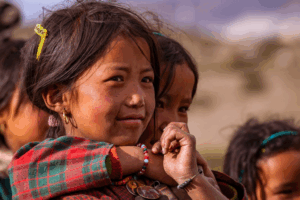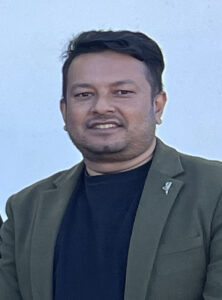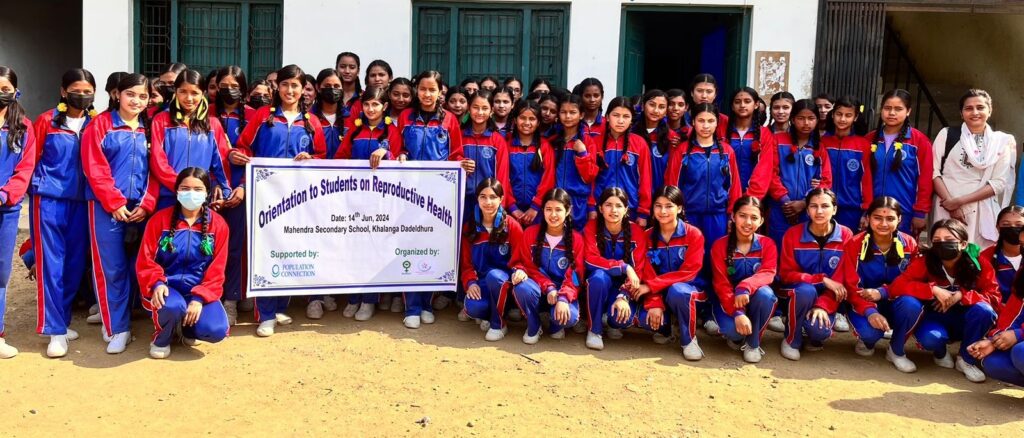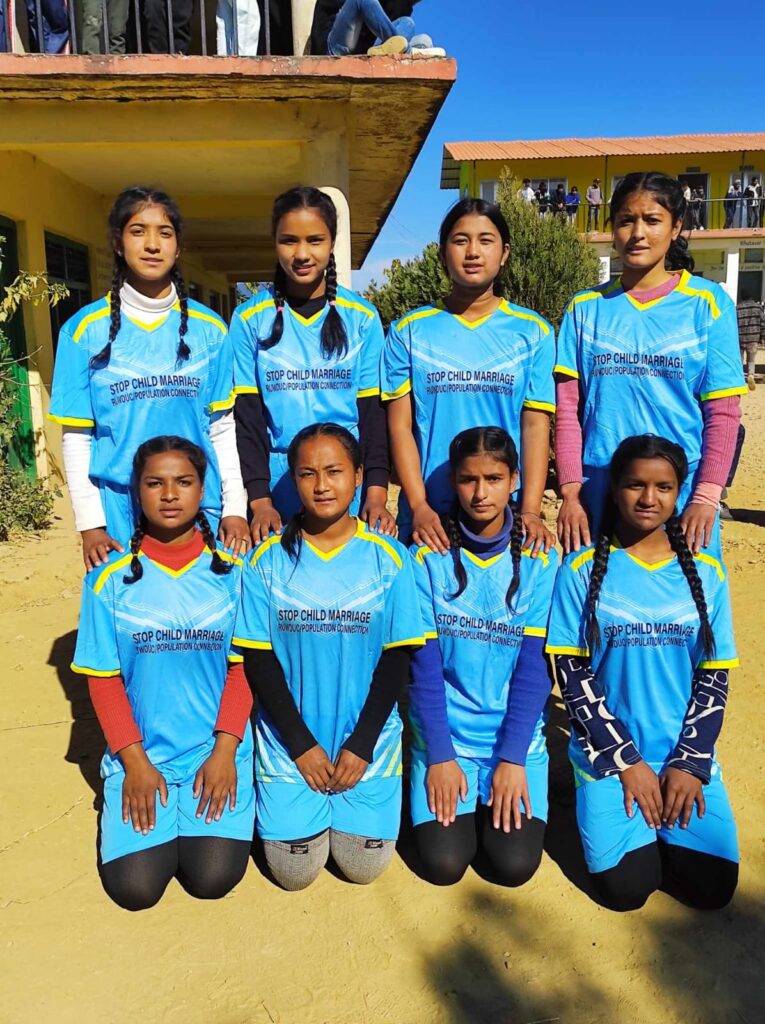Changing Harmful Traditions and Empowering Women and Girls to Take Charge of Their Lives in Rural Nepal
Written by Nancy Power | Published: June 16, 2025
Photos courtesy of RUWDUC
 Population Connection’s thriving Global Partners program assists 18 community-based, locally-led organizations in several countries in Latin America and sub-Saharan Africa and one organization in South Asia: RUWDUC in Nepal.
Population Connection’s thriving Global Partners program assists 18 community-based, locally-led organizations in several countries in Latin America and sub-Saharan Africa and one organization in South Asia: RUWDUC in Nepal.
Due to escalating climate change and land use changes, Nepal is more susceptible to flooding than in the past. Flooding is more frequent and more extreme, resulting in landslides, destruction of villages, and displacement of people and animals. With the help of Population Connection, OXFAM, and other NGOs, in 2022, RUWDUC was able to install an early warning system in Kalakot along the Rangoon River. The grant also allowed RUWDUC to distribute clothing and food to residents in Parshuram Municipality, a river basin community that experienced devastating flooding in the fall of 2021, which forced around 90 families to flee their homes.
Since then, Population Connection has sponsored several RUWDUC initiatives. One of those is the Girls Empowerment Project, which aims to sensitize students and their guardians and teachers about menstruation, family planning, hygiene and sanitation, and child marriage and other harmful practices. The project works to keep girls in school and helps them develop leadership skills that set them up for roles in their community where they can make a difference in other girls’ and women’s lives.
We are proud to support this small but ambitious organization and thank our members for their generous gifts toward our Global Partners program. If you’d like to dedicate your donation to our Global Partners, please visit this page.
– Lee S. Polansky, Senior Director of Executive Initiatives
Dr. Arzu Rana Deuba is from Kathmandu, but she married a man from the impoverished Sudurpashchim Province (called the Far-Western Region prior to 2015) of Nepal. Many of the villages there are accessible only by long, winding roads over difficult terrain. When she visited her husband’s homeland, although dazzled by the natural beauty, Deuba was dismayed by the widespread malnutrition, low education levels, and high infant mortality rate. The area had poor infrastructure, low literacy, glaring gender inequity, and limited means of income generation. In response, in 1995, Deuba collaborated with a group of local Sudurpashchim women to establish the Rural Women’s Development and Unity Center (RUWDUC, pronounced ROO-duck).

RUWDUC’s first project in Sudurpashchim was to provide beehives and beekeeping training to 2,700 farmers, 75% of whom were women, enabling them to sell honey to increase their family income. Thirty years later, 60% of those initial trainees still maintain their beekeeping businesses.
With his mother and aunt among the trainees, nine-year-old Kamal Rawal (photo opposite page) got a close-up view of the project. He saw that the women were excited to keep beehives on their farms and sell honey in the market. He remembers that “they started sending their children to schools and started to purchase nutritious food as well. I was so touched, I thought that I would also become a social worker and serve at remote places.” Rawal is now the Executive Director of RUWDUC.
Changing harmful norms, attitudes, and practices
Chaupadi
RUWDUC works to end two traditions that harm girls’ and women’s health: chaupadi and child marriage. Meaning “becoming untouchable,” chaupadi, a custom unique to Nepal, is — in its most extreme interpretation — the practice of prohibiting girls and women from entering their homes, visiting the temple or water sources, attending school, or cooking when they are menstruating or have recently given birth. In these extreme cases, they are exiled to a hut or cow shed with no doors, far from the house, where they are vulnerable to cold, attacks by wild animals such as venomous snakes, rape, and kidnapping (in order to be sex trafficked internationally). Young children are expected to stay with their mothers in these unsafe conditions. Chaupadi practices fall along a spectrum of severity, but generally involve exclusion from normal household and community activities, sometimes including school.
“It made the girls’ lives hell,” says Rawal. Many women and children have died as a result of it. The practice was still common among adolescent girls in western Nepal as of 2021, according to a survey by the US National Institutes of Health. Another survey, in 2019, found that chaupadi is six times more common in Sudurpashchim than in Nepal as a whole.
Despite the Nepal Supreme Court outlawing the practice and the Parliament passing many laws to eradicate it, monitoring and enforcement so far have been inadequate to eliminate the custom. RUWDUC complements the laws by facilitating discussion about menstruation as a normal biological process, to help end chaupadi voluntarily at the local level. Since chaupadi is rooted in centuries-old patriarchal cultural beliefs about women being impure and inferior, raising awareness and changing norms must be part of any lasting effort to end the practice. In some places where RUWDUC has worked, the girls are now allowed to stay in their homes during menstruation. Rawal’s own mother ended the practice in her family.
Child marriage
RUWDUC also raises awareness about the risks of child marriage. According to UNICEF, as of 2019, 33% of Nepalese women currently in their early 20s were married before age 18, down from 58% in 1994. Among women of all ages, 5.3 million were married or in a union before age 18; of these, 1.2 million married at age 14 or younger.
According to Rawal, typically a 14-year-old boy marries a 12- or 13-year-old girl, who has her first child when she is 15. This practice leads to high maternal mortality — teenagers’ bodies are typically not suited to pregnancy and childbirth. If the girl survives the delivery, she nearly always drops out of school, destroying her prospects for earning a meaningful income. Because she lacks financial independence, she is at greater risk of gender-based violence. RUWDUC provides girls who are already in child marriages with counseling, encourages them to continue their education, informs them about family planning and reproductive health, and warns them of the dangers of chaupadi.
Abortion
Together with Nepali women activists, RUWDUC lobbied for over five years to pass the 11th Amendment to the Civil Code in 2002, decriminalizing abortion in Nepal. RUWDUC also led efforts to release and rehabilitate women imprisoned for abortion-related cases, gathering information from police, lawyers, and affected families to build their legal cases and hiring lawyers to represent them. These efforts led to the release of 30 women from various district prisons. Eight of those women, whose families rejected them after their release, stayed in RUWDUC’s shelter for a year. During this time, they learned sewing skills, and upon completing the training, RUWDUC provided them with seed money and sewing machines to start small businesses, ensuring their financial security and independence.
Girls’ Empowerment Project
Population Connection sponsored the Girls’ Empowerment Project (GEP) at Mahendra Secondary School in the Dadeldhura District of Sudurpashchim Province in 2023 and 2024. The project raised awareness among students as well as their guardians and teachers about menstrual hygiene, family planning, child marriage, and chaupadi. Other topics included domestic violence, drug addiction, and cyber-bullying. To improve girls’ academic performance, the GEP provided access to sanitary products, enabling adolescent girls to attend school during their menses. The GEP also developed the girls’ leadership and oratory skills and increased their participation in sports. All these activities boosted the girls’ confidence, enabling them to take charge of their lives and socialize more. Srijana Sethi reports that, because of participating in the GEP, “I feel that I can put my ideas in [front of] a group of people and fight for my rights.”

From child bride to confident student and role model
Geeta Oad, a young Dalit[1] girl from Belapur Village in Dadeldhura, grew up in a poor family. Due to their hardships, she was married off at 17 to Suresh Tamrakar, a local man from her village.
Once married, Geeta shouldered the burdens of a large, joint family. Her dreams of further education were crushed under the weight of caring for her husband, her parents-in-law, and two brothers-in-law while managing household chores and farm work. Her in-laws constantly pressured her to start having babies. To top it off, Geeta’s husband migrated to neighboring India for work.
Everything changed when Geeta attended a local women’s empowerment program organized by RUWDUC. For the first time, she learned about women’s rights, the damage caused by child marriage, and the importance of education. The sessions ignited her long-suppressed desire to return to school.

STOP CHILD MARRIAGE
RUWDUC/POPULATION CONNECTION
Geeta invited her husband to meet the RUWDUC team, but he resisted. After much persistence, however, she convinced him to return to Nepal for that purpose. Following counseling and advocacy from RUWDUC staff, Geeta’s new family finally agreed to let her enroll in Mahendra Secondary School. Determined to change her life, Geeta used the blessing money (dakshina) she had received at her wedding to pay for her education. She rented a room near the school, embracing her newfound independence.
At school, Geeta actively participated in the GEP’s extracurricular programs, learning about child marriage, adolescent reproductive health, and leadership. These sessions empowered her to advocate for herself: She confidently told her in-laws that she was not ready for motherhood and wanted to focus on her education. For the first time, she understood that pregnancy was her choice, not an obligation.
Now Geeta not only attends classes but also shares her knowledge with her community during school vacations. She raises awareness on menstrual hygiene, child marriage, and drug addiction, while serving as a role model for other girls.
Women finding their voice
All of the teenage girls and adult women beneficiaries of RUWDUC I interviewed said that their connection with RUWDUC had increased their confidence and public speaking skills. As 36-year-old Dhana Awasthi puts it, “My life would have [otherwise] been dark and limited to housework within the four walls of my house.” Bishna Gairal, 45, says, “I used to feel afraid when speaking with others in public and would often avoid participating in groups. I can now speak confidently in public settings and independently lead and organize programs.”
RUWDUC has succeeded at improving the prospects of rural families in Nepal for 30 years in part because it collaborates effectively with many international organizations — Oxfam, the Swedish International Development Cooperation Agency (SIDA), several United Nations agencies (UN Human Rights, UN Women, UN Development Programme), the UK Foreign, Commonwealth & Development Office (FCDO), and World Vision International — to carefully and competently propel its mission into reality. Population Connection proudly stands alongside these larger donors in supporting RUWDUC’s sustainable development projects throughout Nepal.
Nancy Power is a scientist who also writes articles for four different farming magazines. She was a high school science teacher for over 14 years before leaving to earn a PhD in Agricultural Entomology from the University of California, Riverside. She served as a commercial horticulture agent for the North Carolina Cooperative Extension. She lives in North Carolina where she continues teaching and enjoys growing fruit and vegetables. She is passionate about empowering Americans to eat more plant-based foods.
[1]
Dalit people, also known as “untouchables,” are members of the lowest caste in the South Asian countries that have a caste system, including Nepal.

